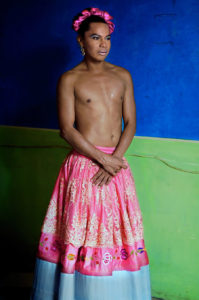Mexico’s Muxes: Body and Politics
 Zapotec Muxhe, Muxe, Lukas Avendaño. Contemporary Performance artist from Mexico. (Photo by Mario Patinho)
Zapotec Muxhe, Muxe, Lukas Avendaño. Contemporary Performance artist from Mexico. (Photo by Mario Patinho) Spanish is a grammatically gendered language non-native to the lands that its country of origin colonized, including the Caribbean and South America. Colonialist Catholicism reshaped many Indigenous cultures, including applying the more rigid and westernized notion that gender is binary. This is reflected in Spanish words that have either a feminine or a masculine connotation. For example, nouns are categorized as either masculine (often ending in -o) or feminine (often ending in -a). Words ending in -o can encompass both male and female identification, but prioritize the masculine and fully exclude those who fall outside the gender binary. This can be marginalizing for people who, in Mexican culture, are referred to by the third-gender or the gender-nonconforming term: muxe.
A muxe (derived from the Spanish “mujer,” meaning “woman” and pronounced “moo-shay”) is a person who is assigned a male or female gender at birth but who dresses or behaves in ways associated with the opposite gender in the binary lens. The community has a strong presence in the Zapotec population, which is concentrated in Oaxaca, Mexico. The “third-gender” muxes mirror the Western cultural understanding of what it means to be genderqueer, and while the Spanish language has failed to create gender neutrality, the people of Mexico have recognized it with pride.
Because the muxe community is complex and diverse, it is difficult to find one definition or descriptor. Culturally, that’s exactly how the community seeks to live: free of labels. Muxes are not only respected but celebrated throughout Oaxaca for their defiance of gender and how essential they are to the community. Muxes are even celebrated with a three-day festival called Vela de la Intrepidas (Vigil of Intrepids).
Even though muxes are considered good luck, the population is still marginalized and facing many of the same challenges that the LGBTQ+ community faces around the world. A mother would prefer to have a muxe child because this allows for an extra hand at home, as muxe are less likely to leave home, marry, and form their own families; they live in a gray area, culturally accepted but socially constrained.
As in all things relating to the LGBTQ community, theirs is a fight for acceptance and for a seat at the table. With media coverage ever increasing, government officials have taken advantage of the community’s identity.
The Oaxaca State Electoral Institute (IEEPCO) created a state electoral law that stipulates parties must nominate an equal number of men and women (including third gender) as candidates, which has led to male politicians fraudulently registering as muxe. The muxe body is being abused for political advantage and gain. Although electoral law is particularly progressive in the city (it’s one of three states that allows people to formally change their gender identity), the politicians are occupying a space that isn’t theirs to hold. In 2018, for example, the Institutional Revolutionary Party (PRI) and the Conservative National Action Party (PAN) nominated nineteen candidates for mayor in a dozen municipalities of Oaxaca. All of the candidates claimed to be transgender, with some going as far as wearing traditional muxe dress to register. But the progress was a sham—only two of the nineteen mayoral candidates were muxe.
There was massive public backlash to what the government claimed was an “irregularity.” The most they did was eliminate the candidates who lied and gave the respective political parties fines. But the issue remains.
Leaders such as Anabel López Sánchez, president of the Collective for Women’s Citizenship (CCM), have stated that this type of subterfuge can be detrimental to political participation and representation for the community and that “proof” of transitioning may be required in the future.
If politicians wish to represent muxe people, they need to be aware of and confront the community’s challenges. Mexico has the highest rate of crime against the LGBTQ community in the world, with over 200 people murdered between January 2014 to December 2016, and the rate is increasing.
Muxe people aren’t bodies that can fill a societal role or a political quota. Although they are celebrated and honored in their communities, legislators and community leaders must do the same. Muxe lives are valued. Their stories must be heard.
